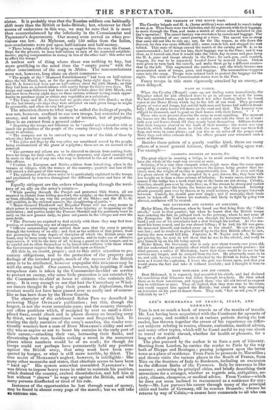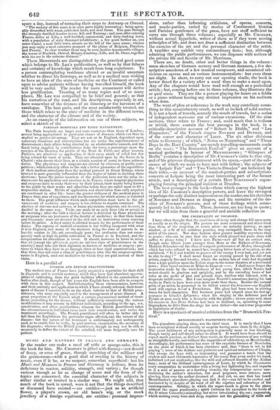LEE'S MEMORANDA ON FRANCE, ITALY, AND GERMANY.
Tun is not so much a book of travels as of the results of travels. Mr. LEE having been acquainted with the Continent for upwards of twenty years, and resided on it at various periods during the last twelve, has thrown together the cream of his experience on differ- ent subjects relating to routes, climate, curiosities, medical advice, and many other topics, which will be found useful to any one about to travel or reside abroad, whether for health or pleasure, for a long or a short period.
The plan pursued by the author is to form a sort of itinerary. Starting from London, he carries the reader to Paris by the way both of Dieppe and Boulogne ; passing judgment upon the latter town as a place of residence. From Paris he proceeds to Marseilles; and thence visits the various places in the South of France, from Nice on the frontiers of Italy to Bordeaux, including an excursion to the different Baths of the Pyrenees. Italy he traverses in like manner ; embracing its principal cities, and briefly describing their attractions for a stranger, whether as regards arts, antiquities, so- ciety, climate, cheapness, or medical advice. From Venice—which he does not seem inclined to recommend as a residence for any- body—Mr. LEE pursues his career through many of the principal cities and baths of Germany, till he reaches Brussels ; whence he returns by way of Calais,—a course here commends to all who can
spare a day, instead of retracing their steps to Antwerp or Ostend.
"The scenery of this route is in some parts highly interesting ; being agree- ably diversified with wood, cultivated lands, and neat farms. You pass through the strongly-fortified frontier towns Ath and Tourney; and soon after entering France, arrive at Lille, a well-fortified, commercial, and dirty-looking town, with a population of sixty thousand inhabitants: a few posts further on, you enter Camel, a neat little town, situate on the bill of the same name; whence you may enjoy a most extensive prospect of the plains of Belgium, Flanders, and Picardy. In clear weather there may be seen, besides innumerable villages, the towns of Dunkirk, Ostend, Bruges, Courtray, Lille, and St. Omer, together with the sea in the extreme distance."
These Memoranda are distinguished by the practical good sense
which belongs to Mr. LEE'S publications, as well as by that fulness and certainty of knowledge which result from long experience. To a person contemplating residence abroad or an invalid uncertain whither to direct his footsteps, as well as to a medical man wishing to have an idea of the state of medicine on the Continent or called upon to advise patients without having travelled himself, the book will be very useful. The reader for mere amusement will derive less gratification. Treating of so many topics and of so many places, Mr. LEE was compelled to be brief and general ; so that his narratives of the road, and his descriptions, especially in art, have somewhat of the dryness of an itinerary,or the bareness of a catalogue. The best parts, and the most satisfactorily treated, are those which relate to the state of medicine in the different towns, and the character of the climate and of the society.
As an example of the information on one of these subjects, we select a sketch of the PARISIAN HOSPITALS AND THEIR MANAGEMENT.
The Paris hospitals are larger and more numerous than those of London ;
several being appropriated to particular classes of diseases, which can thus be studied to greater advantage. They are not, as in England, dependent upon voluntary donations and subscriptions, but are under the superintendence of Government ; their affairs being directed by an administrative council, and the funds being supplied by contributions from the town, a percentage upon the receipts at the theatres, the profits of the Mont de Piete, and other sources. Patients are admitted on application, if their cases admit of relief, but few being refused for want of room. They are attended upon by the Sieurs de la Charlie; who devote their lives, or a certain number of years, to these arduous duties. The physicians and surgeons are elected by concours, or public com- petition; which certainly offers to the sick a better guarantee of the capabilities of their medical attendants than the method pursued in Great Britain, where interest is more generally influential than the degree of talent in deciding these elections : hence the junior members of the profession have not the same in- ducements for application and exertion as in France, where hospital physicians and surgeons have to make their way by their labour, their merits being known to the public by their works and otherwise before they are called upon to fill a responsible station. Habits of application and observation thus early acquired are continued in after life : hence the greater richness of the medical press in France from men of experience, and the discoveries for which science is indebted to them. The great influence which such competition must have in the ad- vancement of medicine and surgery is too obvious to require comment. The election of internee and externea, or house physicians, surgeons, and dressers, is decided in the same way. Visits are made at an early hour (six or seven) in the morning; after the visit a clinical lecture is delivered by those physicians or surgeons who are professors of the faculty of medicine; so that three hours and frequently more are devoted to the sick and to instruction every morning before breakfast. A fixed salary is allotted to each for the performance of these duties. The expense of medical education is but trifling compared with what it is in England, and many of the students being the sons of parents in an humble station in life, are exceedingly poor; the profession does not conse- quently rank so high in public estimation in France as in England, and the compensation for attendance is lower. It should, however, be borne in mind, that all (except the officiers de sante, an inferior class of practitioners in the country) must take out their diplomas as doctors of medicine or surgery ; pre- vious to which they have to go through three or four rigid examinations; and that there does not exist a class of practitioners who, like the surgeon-apothe- caries in England, send out medicines for which they are paid instead of their visits.
Here is a parallel of ENGLISH AND FRENCH PRACTITIONERS.
The medical men of France have justly acquired a reputation for their skill an diagnosis and in morbid anatomy, which they have had abundant opportu- nities of cultivating, from the great facilities afforded in the examination of bodies after death, though of late years the English have been able to compete with them in this respect. Notwithstanding these circumstances, however, and their assiduity and application to which I have already referred, their treat- ment of disease I conceive to be on the whole inferior to that of British prac- titioners, who more especially excel in the management of acute diseases. A great proportion of the French adopt a certain preconceived method of treat- ment, prescribing for the disease, without sufficiently considering the various modifications it may assume in different individuals, according to the age, sex, constitution, and other peculiarities; whereas the British practitioner takes the circumstances in individual cases more into consideration, and varies the treatment accordingly. The French practitioner will often be better able to tell than the Englishman the particular organ affected, and the extent of the disease: but the nature of his treatment is unfortunately not unfrequently such as to enable him to verify, by post-mortem examination, the accuracy of his diagnosis; whereas the British practitioner, though he may not be able so accurately to define the extent of the mischief, will more frequently cure his patient.



























 Previous page
Previous page